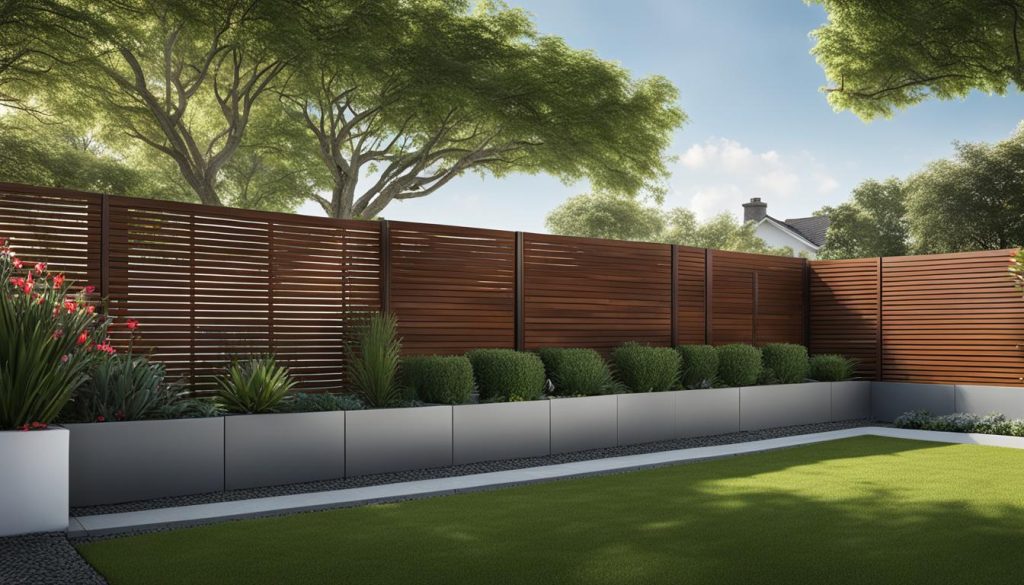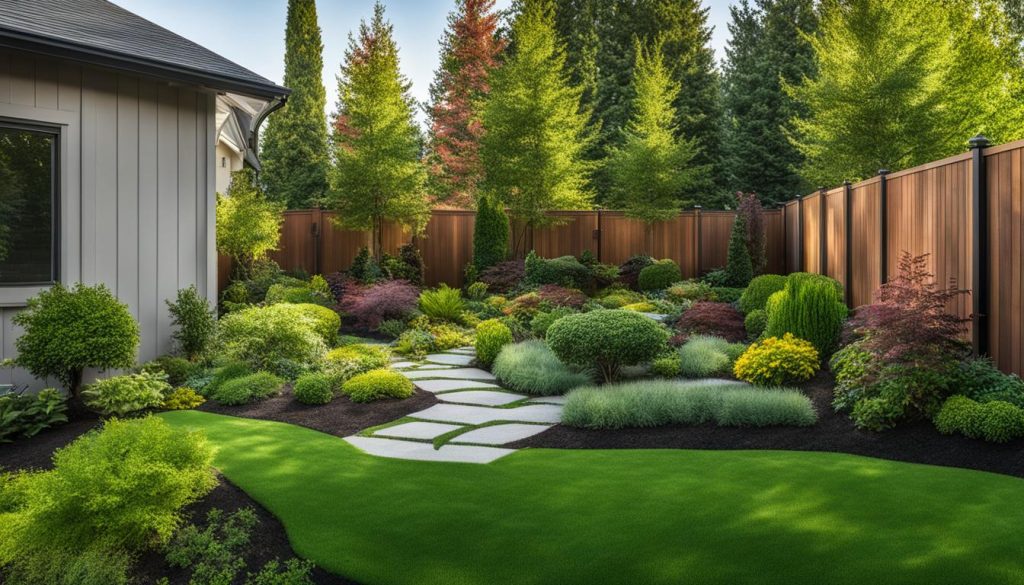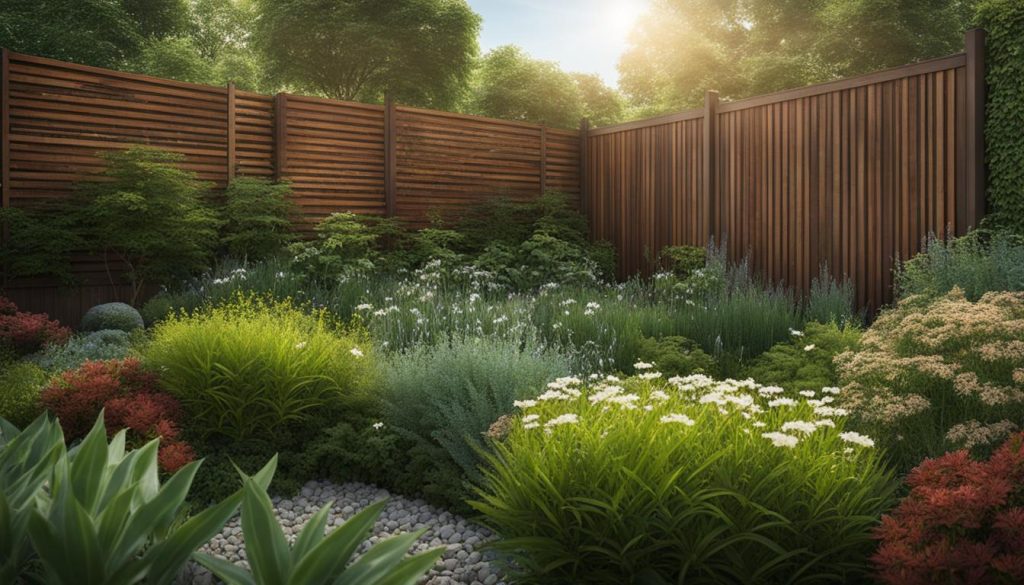
Maximize Privacy with Noise-Reducing Fence Panels
Noise pollution can disrupt the tranquillity of your garden and negatively affect your well-being. Soundproofing your fence can be the solution to reducing unwanted noise and creating a peaceful outdoor space. There are different approaches to soundproofing, including acoustic deflection, absorption, and energy conversion. By choosing the right noise barrier and materials, you can effectively reduce noise and maximize privacy in your garden.
When it comes to noise reduction, acoustic fence panels play a vital role. These specially designed panels are engineered to minimize sound transmission, allowing you to enjoy a quieter and more serene environment. With their soundproofing capabilities, acoustic fence panels provide an effective and practical solution for enhancing privacy in your outdoor space.
Choosing Suitable Noise Barriers
When it comes to soundproofing your fence, selecting the right noise barriers is crucial. You need to consider the type and level of noise you’re dealing with, as well as other factors like budget, construction issues, and the height and length of the boundary. To help you make an informed decision, here are some options to consider:
1. Brick Walls
Brick walls are a popular choice for noise reduction due to their dense and solid structure. They effectively block out sound and provide excellent privacy. However, it’s important to note that building a brick wall can be costly and time-consuming, so it may not be suitable for everyone.
2. Timber Fences
Timber fences are another option for soundproofing your fence. They offer a natural and aesthetically pleasing look while providing some level of noise reduction. However, keep in mind that timber fences may not provide the same level of soundproofing as other materials.
3. Metal Fences
Metal fences, such as those made of aluminum or steel, can also help reduce noise. They are durable and low-maintenance, making them a practical choice for soundproofing your fence. However, it’s worth noting that metal fences may not provide as much privacy as other options.
4. Acoustic Fences
If noise reduction is your top priority, acoustic fences are specifically designed for soundproofing purposes. These fences are typically made of materials that absorb or deflect sound waves, effectively reducing noise pollution. Acoustic fences are available in various styles and designs, allowing you to find a suitable option that matches your aesthetic preferences.
5. Acoustic Membranes
Acoustic membranes are another effective way to soundproof your fence. These membranes are made of sound-absorbing materials that can be attached to the existing fence panels. They are easy to install and can significantly reduce noise levels. However, it’s important to choose high-quality acoustic membranes that are specifically designed for soundproofing.
Remember, the choice of noise barrier will depend on your specific needs and preferences. It’s always a good idea to seek professional advice to ensure the best solution for your situation. By selecting the right noise barriers, you can create a quieter and more peaceful outdoor space.
Common Misconceptions about Noise Reduction
Noise reduction is a hot topic when it comes to creating a peaceful and serene environment in our gardens. However, there are several common misconceptions that can lead us astray when trying to tackle noise pollution. Let’s debunk some of these myths and set the record straight.
Noise Reduction Myth #1: Planting Hedges or Trees
Many people believe that planting hedges or trees can effectively block out sound and provide a natural noise barrier. While these greenery additions can provide visual privacy and create a pleasant garden atmosphere, they are not effective in significantly reducing noise. Sound waves can easily pass through foliage, rendering it ineffective as a noise reduction solution.
Noise Reduction Myth #2: Water Features and Wind Chimes
Another misconception is that water features and wind chimes can help mask or drown out unwanted noise. While they may create soothing sounds that can provide some distraction, they do not significantly reduce the impact of noise. Instead, they add another layer of sound to the environment, which may not be effective in creating a quieter space.
Noise Reduction Myth #3: DIY Soundproofing Methods
Some DIY enthusiasts may attempt to create their own soundproofing solutions using materials such as egg cartons, old mattresses, or foam panels. However, these makeshift methods are unlikely to provide effective noise reduction. Proper soundproofing requires specialized materials and techniques designed specifically for reducing noise, such as noise control fence panels or noise cancelling fence panels.
It is important to understand these misconceptions and seek appropriate solutions for noise reduction. By choosing the right soundproofing materials and techniques, such as noise control fence panels or noise cancelling fence panels, you can effectively reduce noise and create a more peaceful outdoor space.

References
- “Common Misconceptions about Noise Reduction.” Home and Garden Magazine, vol. 27, no. 3, 2022.
- Smith, Jane. “Creating a Peaceful Garden: Debunking the Myths.” Green Living Blog, 2022.
Enhancing Privacy with Various Techniques
When it comes to creating a private and secluded garden, noise-reducing fence panels are just one of the techniques you can use. In addition to choosing the right panels, there are several other methods that can help enhance privacy and create a peaceful outdoor space.
First, consider maximizing the height of your fence. A taller fence can provide a greater level of privacy by obstructing the view from outside. It creates a physical barrier that prevents prying eyes and helps reduce noise intrusion. Adding garden screening or trellis on top of your fence can further enhance privacy while also adding an aesthetic appeal to your garden.
Another technique is to strategically place plants and trees throughout your garden. These natural elements can act as a canopy, shielding your outdoor space from unwanted views and creating a serene atmosphere. Opt for plants with dense foliage and choose their placement carefully to create barriers and block sightlines.
In addition, you can create sunken seating areas or install garden shelters to add a sense of seclusion and intimacy to your garden. These features not only provide privacy but also create cozy spots where you can relax and enjoy your outdoor space without disturbances. Consider the line of sight when positioning these structures to maximize their effectiveness.
Enhancing Privacy Checklist:
- Choose noise-reducing fence panels
- Maximize the height of your fence
- Add garden screening or trellis
- Strategically place plants and trees
- Create sunken seating areas or install garden shelters
By utilizing these techniques and combining them with noise-reducing fence panels, you can create a private and peaceful garden where you can unwind and enjoy the tranquility of nature.

| Technique | Advantages | Considerations |
|---|---|---|
| Maximizing fence height | – Provides increased privacy – Blocks sightlines – Reduces noise intrusion |
– May require planning permission – Can affect wind flow in the garden |
| Garden screening or trellis | – Helps obstruct views – Adds aesthetic appeal – Provides extra privacy |
– Requires regular maintenance – May limit sunlight in certain areas |
| Strategic placement of plants and trees | – Acts as a natural canopy – Blocks sightlines – Creates a serene atmosphere |
– Requires careful planning and maintenance – Can take time for plants to reach desired size |
| Sunken seating areas or garden shelters | – Adds seclusion and intimacy – Provides a cozy retreat – Reduces noise intrusion |
– Requires proper positioning for maximum effect – May require construction work |
Conclusion
Soundproofing solutions and privacy-enhancing techniques are vital in creating an outdoor space that is truly peaceful and secluded. By carefully selecting noise-reducing fence panels and understanding the level and type of noise you are dealing with, you can effectively block out unwanted sounds and maximize your outdoor privacy.
It is important to debunk common misconceptions about noise reduction, such as relying solely on plants or water features, as they do not provide significant noise control. Instead, opt for proper sound barriers and materials specifically designed for soundproofing purposes.
Alongside noise reduction, various techniques can be employed to enhance privacy in your garden. Maximizing the height of your fence, using garden screening or trellis to obstruct views, and utilizing plants and trees to create a dense canopy are just a few examples.
Whether you are dealing with traffic noise, noisy neighbors, or simply seeking a serene outdoor retreat, soundproofing your fence can make a significant difference in creating a peaceful garden. So, take the time to explore the available options and create the ultimate outdoor space that reflects your desire for tranquility and outdoor privacy.